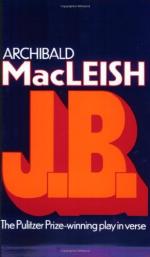
|
| Name: _________________________ | Period: ___________________ |
This test consists of 15 multiple choice questions and 5 short answer questions.
Multiple Choice Questions
1. J.B., even though he is covered with sores, says that God only punishes if he has what?
(a) Knowledge of the truth.
(b) Weighing the consequences.
(c) Reward in the end.
(d) A reason.
2. J.B. says he's tired of what when Nickles argues with him about the end?
(a) People.
(b) God.
(c) Tricks.
(d) Games.
3. After Zuss and Nickles put on their masks in Scene 7, what is the name of the character who urges God to destroy J.B.'s body?
(a) Sarah.
(b) Satan-mask.
(c) Nickles.
(d) Satan.
4. Why does Zuss call for the lights in Scene 10?
(a) Another play has to start.
(b) The story's not over.
(c) The epilogue has to begin.
(d) The story is over.
5. What makes Zuss and Nickles able to put on their masks again?
(a) They agree to stay out of J.B.'s life.
(b) They agree to finish the story they started.
(c) They agree to help Sarah.
(d) They agree to reverse everything that has happened.
6. Zuss is angry that after being shown all of God's glory J.B. simply what?
(a) Repented.
(b) Gave in.
(c) Accepted fate.
(d) Folded.
7. After Zuss calls for the lights in Scene 10, what does Nickles complain about?
(a) That there couldn't possibly be more.
(b) That he doesn't like his job.
(c) That there isn't anywhere to go from here.
(d) That the story didn't have a happy ending.
8. Zophar, Eliphaz, and Bildad offer what type of answer to J.B.'s question about what he has done?
(a) Blurred.
(b) Distorted.
(c) Enigmatic.
(d) Clear.
9. Who says, "His will, our peace?"
(a) Sarah.
(b) J.B.
(c) Nickles.
(d) Zuss.
10. The quote, "His will, our peace," comes from what book?
(a) The Confessions.
(b) The Divine Mystery.
(c) The Inferno.
(d) The Letters to the Romans.
11. Why does Sarah leave J.B.?
(a) Because he reminds her of the children.
(b) Because he continues in his beliefs.
(c) Because he believes her to be guilty of sin.
(d) Because he is covered with sores.
12. When Zuss and Nickles put on their masks at the end of Scene 7, what is the emotion they feel towards the expanse of God and the depth of his knowledge?
(a) Excitement.
(b) Fear.
(c) Loathing.
(d) Resentment.
13. Nickles climbs up the ladder at the end of Scene 8 and calls God by his name in what language?
(a) Hebrew.
(b) Italian.
(c) Latin.
(d) Greek.
14. Nickles complains that God has done what, tumbling a whole city down to blister one man's skin with agony?
(a) Gone over the top.
(b) Gone over the deep end.
(c) Become vengeful.
(d) Been obsessive.
15. What does Eliphaz wear?
(a) Scrubs.
(b) An intern's jacket.
(c) A suit.
(d) A long lab coat.
Short Answer Questions
1. Eliphaz says that guilt is what?
2. In Scene 7, who quotes God's lines from the Bible where he asks the devil to consider the perfection of Job's devotion?
3. After Zuss and Nickles put on their masks in Scene 7, what is the name of the character who speaks of Job's integrity?
4. Who tells J.B. that God will give him everything back?
5. Why does J.B. apologize to Zophar, Eliphaz, and Bildad?
|
This section contains 521 words (approx. 2 pages at 300 words per page) |

|




